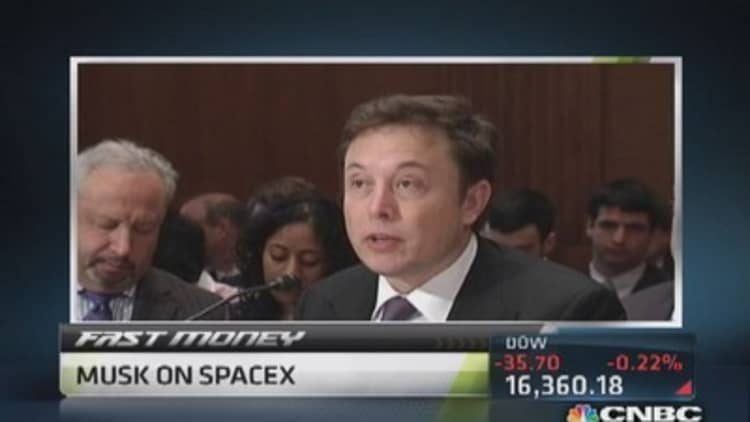Right now there are two American astronauts at the International Space Station, Mike Hopkins and Rick Mastracchio. They only have one way back to Earth—a Russian capsule.
Ever since NASA's shuttle program ended, the space agency has been paying the Russians about $70 million per seat to transport astronauts to and from the orbiting station.
(Read more: Obama orders asset freeze, visa bans)
Now, tensions between the two countries over Russia's movements in Ukraine have some worried that Hopkins and Mastracchio could end up stranded, and their American replacements grounded. To be sure, most agree that situation is unlikely: There's no upside for Russian President Vladimir Putin in holding U.S. astronauts hostage. Plus, there are alternatives. If necessary, the Chinese have the capability of taking humans to and from a space station.
However, the big winner in an otherwise losing situation in Ukraine could be NASA. Congress is looking to cut spending across the board, but it could be persuaded to put more money into the space program to accelerate both NASA and private-party efforts to return space station access to Americans. SpaceX and Orbital Sciences have conducted cargo resupply vehicles that docked with the station, but neither can yet carry humans there. SpaceX, owned by Elon Musk, plans to test its Dragon capsule this year to make sure it can safely separate itself from a rocket and return safely if there's a problem, a key milestone toward putting passengers on board.

NASA has also ordered Boeing and Sierra Nevada Corp. to come up with similar "space taxi" designs. Lockheed Martin is building a craft that could carry astronauts not just to the station, but to the moon, asteroids and maybe even Mars. The difference is that SpaceX would maintain ownership of its rockets and capsules and contract them out to NASA, while Lockheed's Orion would be owned by NASA and launched by NASA-owned heavy lift rockets.
President Barack Obama's proposed budget for the next fiscal year calls for a 1 percent cut to NASA's 2014 budget, but it also asks for a $56 billion Opportunity, Growth and Security Initiative outside the budget that the space agency could tap into. Congress may be loath to say "no" given the situation with Russia. The president reportedly wants to have American rockets and vehicles flying astronauts to the station by the end of 2017, and while NASA administrator Charles Bolden told Reuters that nothing has changed with the U.S. relationship with Russia, "we are continuing to monitor the situation."
(Read more: World is not enough: Millionaires bet on space)
"Space innovation has stagnated," Musk told a Senate panel that was investigating the most effective ways to launch national security satellites. Currently those payloads are launched through the United Launch Alliance, a joint venture of Boeing and Lockheed Martin, using Atlas rockets with a Russian-made engine.
"In light of Russia's de facto annexation of Ukraine's Crimea region, and the formal severing of military ties," Musk said this week, "the Atlas 5 cannot possibly be described as providing assured access to space for our nation, when supply of the main engine depends on President Putin's permission."
United Launch Executive Director Michael Gass replied that he had an inventory of engines and the blueprints to build one if necessary, but Musk pointed out that all of SpaceX's products are made in America.
At the same time, a state legislator in California is hoping to encourage more space technology innovation. State Sen. Steve Knight, a Republican from Palmdale, has proposed a bill to exempt aerospace companies investing in the state from certain taxes. The California Aerospace Innovation Hub Act of 2014 seeks "to improve the ability of the state to retain and attract aerospace businesses and the high-wage, middle-class jobs that these businesses provide."
(Read more: Why US can export nat gas without raising prices)
After years of NASA budget cuts, and after watching the shuttle program end before a replacement could be developed, America's space program is in a reinvention phase. The new business model includes traditional NASA funding for in-house programs that push the envelope of technology and exploration, combined with private ventures that contract to provide NASA with "off the shelf" services and are financed mostly by wealthy men who have a passion for space.
All that's missing is an appetite by taxpayers to pay for the future when so much of the present needs attention. The current dependence on Russia by the U.S. space program may help move public opinion in NASA's favor.
—By CNBC's Jane Wells. Follow her on Twitter @janewells.


